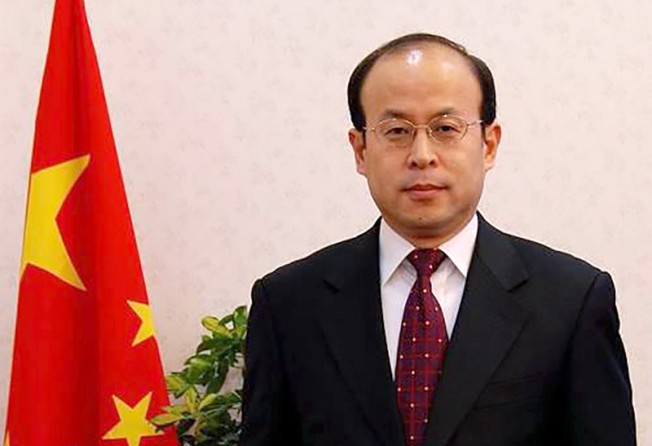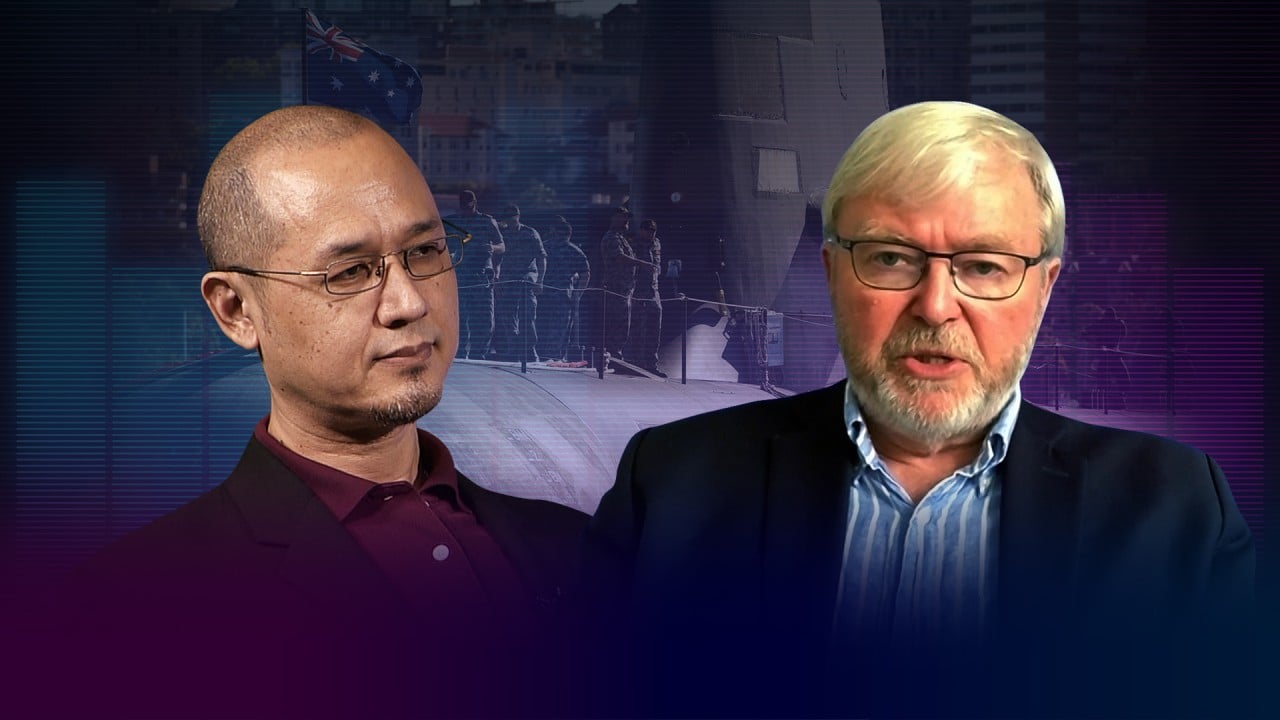China-Australia relations: Beijing’s new envoy to Canberra Xiao Qian is tough, but no ‘wolf warrior’. Will he make a difference?
- New envoy Xiao Qian has extended an olive branch to Canberra. But while some see a subtle shift in China’s tone, others say nothing fundamental has changed
- Xiao has experience in three of the four Quad countries and his time in Indonesia leads some to speculate he will leverage Asean to “nudge” ties in a positive direction

China’s new ambassador to Australia Xiao Qian may have extended an olive branch by expressing a willingness to repair strained relations between his country and Australia, but the jury is out on whether his appointment will be enough to turn things around.
While some analysts saw Xiao’s appointment as a tactical, though subtle, shift away from China’s “wolf warrior” diplomacy of recent times, others cautioned that big differences between Beijing and Canberra remained.
Xiao, who arrived in Australia on Wednesday, said in an official statement that he looked forward to working with the Australian government and business leaders to ensure that bilateral relations – which have deteriorated precipitously in the past two years – get back on the right track.
Describing ties as being at a “critical juncture”, Xiao said the relationship faced “many difficulties and challenges as well as enormous opportunities and potential”.
“The Chinese side always believes that a sound, steady China-Australia relationship serves the fundamental interests of the two countries and the two peoples, and contributes to the prosperity and stability of the Asia-Pacific region,” he said.
“As long as both sides adhere to the principles of mutual respect, equality, inclusiveness and mutual learning and firmly grasp the right direction of the development, China-Australia relations will keep moving forward and make further progress,” Xiao added.
Xiao’s description of his role as a “noble mission” and “great responsibility” came amid heightened tensions and a diplomatic freeze between Canberra and Beijing.
The deterioration in ties has seen Beijing slapping high tariffs on Australian wine and barley, and informally restricting imports of several Australian goods including coal. Canberra also cancelled an informal Belt and Road deal between Australia’s Victoria state government and China.
Tensions worsened in September when Australia joined Aukus, a military alliance including the United Kingdom and the United States that is aimed at transferring nuclear submarine technology to Canberra – and is widely seen as pushing back against China’s growing assertiveness in the region.

‘Nothing has changed’
China’s nationalistic tabloid Global Times said Xiao’s relatively conciliatory message was an attempt to “reset” relations.
If so, the message was lost on many in Australia, with Defence Minister Peter Dutton maintaining that Beijing’s belligerent approach in the Indo-Pacific region was unacceptable.
Vowing that he would continue to call out Chinese aggression and human rights violations, Dutton claimed that not doing so “would make Australia appear weak”.
Richard McGregor, senior fellow for East Asia at the Lowy Institute in Sydney, said he would not read too much into Xiao’s comments.
“As mildly conciliatory they are on the surface, they signal no shift in policy by China,” McGregor said, adding that Beijing’s trade sanctions against Canberra were still in place and Australia remained critical of China on a range of fronts.
“Nothing fundamental has changed,” McGregor said.
James Laurenceson, one of Australia’s leading China watchers and director of the Australia-China Relations Institute, said that while an Australian foreign ministry spokesperson had issued a cordial greeting following Xiao’s arrival, the defence minister had “barged in from the sidelines, grabbed the megaphone and commented on everything from how other countries in the region were threatened by China, to cyberspace and human rights”.
“Perhaps it is an ill-judged good cop, bad cop routine, the latter imagined to make clear to Beijing that the Australian government is not for turning in its approach,” Laurenceson said.
“Alternatively, there simply isn’t any strategy other than a general sense that talking tough on China might play well to a domestic audience in the lead up to a federal election in May,” he added.
Political observers in Australia said that hyping up threats from China was widely seen as a winning ticket for the election, which must be called by May this year.
Chinese observers quoted in the Global Times recently predicted that ties would worsen in the lead-up to the vote, with candidates likely to “make multiple aggressive speeches targeting China to serve as a publicity stunt to help them win more votes”.
Tough, but no wolf
Xiao, 57, a career diplomat, has previously worked in Ethiopia, India, the United States, the Philippines, Hungary and Indonesia.
Chong Ja Ian, associate political science professor at the National University of Singapore, said Xiao’s appointment suggested that Beijing wanted someone who was familiar with Australia’s neighbourhood.
“Given the interest recent Australian governments have placed in engaging its immediate neighbours to the north as well as Canberra’s active roles in the Quad and Aukus [this suggests] increased Australia-Southeast Asia interactions,” Chong said referring to Canberra’s membership in the two alliances spearheaded by Washington.
Wen-Ti Sung, a lecturer at Australian National University, said Xiao appeared to have the right credentials “to help lead Australia-China relations at this challenging juncture”, noting that Xiao had previously served in the US and India, two of the four members of the Quad, or the Quadrilateral Security Dialogue.
“And now Xiao is in Australia, giving him greater insight into the domestic dynamics driving three of the four Quad member countries,” Sung said, adding that Xiao’s experience in Indonesia pointed to the possibility of leveraging the Association of Southeast Asian Nations (Asean) “to help nudge Australia-China relations in a more stabilising direction”.
“One can only hope that Xiao’s familiarity with the process of democratic persuasion and the more consensus-oriented ‘Asean Way’ will lead to a decrease in wolf warrior- style rhetoric in the future,” Sung added.
‘The Asean way’ is the Southeast Asian bloc’s method of establishing a consensus on issues and following a principle of non-interference in the internal affairs of members.
The “wolf warrior” label has increasingly been applied to outspoken and sometimes aggressive representatives of China’s foreign ministry in recent years. However, it has not been used to describe Xiao – who is more often described as “smart” and “tough”.
During the five-year tenure of Xiao’s predecessor, Cheng Jingye, the Chinese embassy issued a list of 14 grievances with Australia that it said had “poisoned bilateral relations”. These ranged from “interfering” in Hong Kong’s affairs and an “unfriendly” media.
Cheng had also taken to issuing sternly-worded statements and warned that Canberra’s demands for an investigation into the origins of Covid-19 would result in a Chinese boycott of Australian universities, tourism, beef and wine.
Beijing then imposed more than US$20 billion of trade strikes on Australia including on beef, wine, lobsters and barley.

Do personalities matter?
Chong from the National University of Singapore said that differences between Canberra and Beijing were ultimately over policy, issues, and positions and not about personalities.
“The role individuals can play is perhaps less consequential, even if public statements and actions garner a lot of media attention,” Chong added.
Laurenceson said that no one expected the arrival of a new ambassador to be a turning point.
“But it was an opportunity for both sides to take a step back from the heated public exchanges that have achieved nothing of benefit and invest instead in some basic level of goodwill.”
“Unless the foreign minister is prepared to take charge of the situation, which she has shown little sign of wanting to do, the next possible opportunity will be if there’s a change of government in Canberra in May,” said Laurenceson, referring to Marise Payne who has been foreign minister since 2018.
This week, Anthony Albanese, leader of the opposition and the Australian Labor Party, said that if his party won the elections, he would attempt to balance Australia’s human rights concerns with economic prosperity.
Why refuse a reset?
Asked why Australian politicians seemed to be refusing a reset with the country’s largest trading partner, retired Australian diplomat Bruce Haigh said conservative politicians had always been “racist and uneasy with the relationship with China, Southeast Asia, India, and Africa”.
These concerns were held at bay by “established and complex relationships” such as those relating to trade, investments, universities and family ties and as such conservative voices in Australia acquiesced as a minority even though they remained wary of the success of China, Haigh said.
But Washington’s challenges of China had given conservative politicians a green light for dissent against China and other emerging countries, Haigh said, adding that Chinese President Xi Jinping’s increasing assertiveness “played into their hands”.
The growing power of anti-China news outlets and defence-funded groups which were close to the government contributed to the problem.
In short, politicians retreated into their “anglo” comfort zone which the US “plays upon”, Haigh said.
